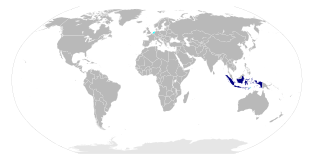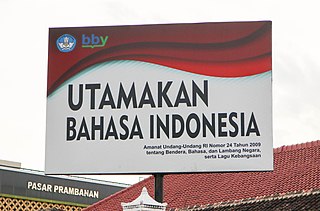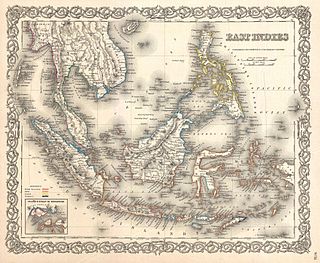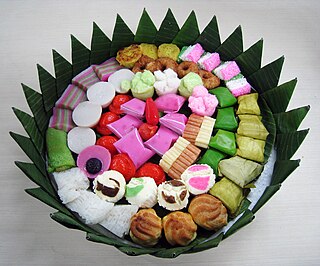| Indonesian Word | Indonesian Meaning | Tamil Word | Tamil Transliteration | Tamil Meaning | Note |
|---|
| acaram | 1. ring,
2. earnest money | அச்சகாரம் | accāram | earnest money | |
| acu | mould, model | அச்சு | accu | mould | |
| andai | if, suppose | அண்டை | aṇṭai | near, support | |
| apam | kind of cake | அப்பம் | appam | appam, rice cake, bread pastry | |
| badai | storm | வாடை | vāṭai | wind, north wind | |
| bagai | sort of | வகை | vakai | kind, sort | |
| baji | wedge | வசி | vaci | cleft, point, edge | |
| basi | 1. commission, fee
2. overtime or extra pay
3. reduction (in price), discount | வாசி | vāci | 1. difference
2. rate, as of interest; portion
3. discount, in changing money | |
| batil | copper bowl, plate, tray | வட்டில் | vaṭṭil | a brass tray, a platter; basket | |
| bedil | gun, rifle | வெடி | veṭi | explosion, as of gun | via Javanese bedhil |
| bicu | lever | வீச்சு | vīccu | blow, stroke | |
| biram | 1. elephant,
2. double-headed snake,
3. red | வேழம் | vēḻam | elephant | |
| canai | grindstone | சாணை | cāṇai-k-kal | grindstone | |
| cemeti | whip | சம்மட்டி | cammaṭṭi | 1. (horse-)whip,
2. large hammer | |
| cerpelai | mongoose (Herpestes sp.) | கீரிப்பிள்ளை | kīri-p-piḷḷai | common Indian mungoose, Indian ichneumon, Herpestes mungo | |
| cerpu | leather sandals (terompah-like) | செருப்பு | ceruppu | leather sandals, slippers, shoes | |
| cerutu, serutu | cigar | சுருட்டு | curuṭṭu | 1. curling, coiling;
2. cigar | |
| ceti | money lender | செட்டி | ceṭṭi | mercantile caste, traders | from Prakrit sēṭṭišrēṣṭhin |
| cukai | excise tax, custom | சுங்கம் | cuṅkam | duty on goods, customs, tolls | from Prakrit šuṅkašulka |
| cuku | dried gambier roots | சுக்கு | cukku | dried ginger | |
| cuma | only, no others | சும்மா | cummā | leisurely, without any occupation or work | ? |
| gula | sugar | குளம் | kuḷam | sugar | *? |
| gulai | kind of curry | குலை | gulai | | *? |
| gundu | marbles | குண்டு | kuṇṭu | ball; anything globular and heavy | |
| gurindam | two lines rhyme | கிரந்தம் | kirantam | 1. book, treatise
2. A verse or prose containing 32 syllables, šlōka | from grantha. |
| helai | sheet | இலை | ilai | leaf, petal | |
| jodoh, joli | mate, partner | சோடி | cōṭi | couple, pair | loanword from Hind. jōḍi. |
| joli | royal sedan | டோலி | ṭōli | a kind of sedan | loanword from Hind. ḍōlā. |
| kambi | wooden frames to strengthen the edges of doors | கம்பி | kampi | wall plate | |
| kapal | boat | கப்பல் | kappal | ship, sailing vessel | |
| kari, kare | curry | கறி | kaṟi | curry | |
| katai, katik | small, short | கடை | kaṭṭai | short, low, dwarfish
defect, deficiency | |
| katelum | bastion | கொத்தளம் | kottalam | part of a rampart, bastion, defensive erection on the top of a rampart | from Pāli koṭṭhaka |
| kati | a measure of weight = 6¼ ons | கட்டி | kaṭṭi | a measure of weight = 25 palams | |
| katik | 1. Paspalum scrobiculatum ,
2. Treron curvirostra ,
3. area measurement (of land or field) | கட்டை | kaṭṭai | mile | |
| katil | bed | கட்டில் | kaṭṭil | 1. cot, bedstead, couch, sofa,
2. Throne | |
| kawal | guard, escourt | காவல் | kāval | defence, protection, watchman, guard | |
| kedai | foodstall | கடை | kaṭai | bazaar, shop, market | |
| kedelai | Glycine max | கடலை | kaṭalai | Cicer arietinum , Melastoma malabaricum | Kanarese, Travancore usage kaḍale, Malayalam kaḍala |
| keledai | Equus asinus | கழுதை | kaḻutai | Equus asinus | |
| ketumbar | Coriandrum sativum | கொத்தமல்லி | kottamalli | Coriandrum sativum | from Sanskrit कुस्तुम्बुरु (kustumburu) |
| kodi | twenty units | கோடி | kōṭi | 1. Crore, ten millions,
2. large number | |
| kolam | pool, pond, basin, tank | குளம் | kuḷam | tank, pond, reservoir, lake | |
| konde, kundai | dressing of hair in large coil on the head | கொண்டை | koṇṭai | tuft, dressing of hair in large coil on the head | related to Telugu koṇḍe, Kanarese Travancore goṇḍe, Malayalam koṇṭa |
| korundum | natural Aluminum oxide | குருந்தம் | kuruntam | corundum, emery | |
| kudai | basket made of rattan | கூடை | kūṭai | basket made of rattan, ola or bamboo | |
| kuil | temple | கோயில் | kōyil | 1. Palace,
2. Temple, Sanctuary | |
| kulai | limp | குலை | kulai | to untie, loosen, dishevel | |
| kuli | physical worker | கூலி | kūli | 1. wages, pay;
2. fare, hire, freight | |
| kundi | clay craftsman | | kuṉṟi | | ? |
| ladam | horseshoe | லாடம் | lāṭam | horseshoe | |
| lebai | mosque employees | லப்பை | lappai | Tamil-speaking Muhammadans | |
| logam | metal | உலோகம் | ulōkam | metal | from lōha metal |
| madali | a musical instrument | மத்தளம் | mattaḷam | a kind of drum | |
| malai | strands | மாலை | mālai | anything strung together | |
| maligai | royal chamber in palace | மாளிகை | māḷikai | top floor of a storied building | ? |
| mangga | mango | மாங்காய் | māṅkāy | mango | |
| manik | beads | | maṇi | | |
| manikam | diamond | மாணிக்கம் | māṇikkam | gem, precious stone | |
| merikan, marikan | clothes from America | மரிக்கன் | marikkaṉ | from America | |
| maru | disturbing ghost | மாற்று | māṟṟu | to change, alter
to conceal, hide
to shift; to transfer, as from a place | |
| matu | grade of gold | மாற்று | māṟṟu | degree of fineness of gold or silver | |
| mempelam | mango | மாம்பழம் | mā-m-paḻam | mango fruit | |
| merunggai | Moringa oleifera | முருங்கை | muruṅkai | Moringa pterygosperma | |
| metai | bed | மெத்தை | mettai | bed, cushion | |
| meterai | seal, stamp | முத்திரை | muttirai | 1. impress, mark
2. seal, signet
3. stamp, as for postage, for court fees | |
| misai | mustache | மீசை | mīcai | 1. upper part,
2. cf. šmašru. moustache | |
| modal | capital, stock | முதல் | mutal | 1. beginning
2. principal, fund, capital, money yielding interest
3. stock, store | |
| mundam | large tub for royal bathing | முந்தை | muntai | small vessel | |
| mutu | 1. quality, purity of gold
2. sad
3. In pinch (chess) | முட்டு | muttu | difficulty, as in passing,
hindrance, obstacle, impediment | |
| nali | volume unit =16 gantang =1/50 koyan | நாழி | nāḻi | tubularity; tube,
a measure of capacity, =8 ollocks | related to nāḍi |
| nelayan | fisherman | நுளையன், கரையான், வலையன், வலைஞன் | nuḷaiyaṉ, karaiyāṉ, valaiyaṉ, valaiñaṉ, | fisher(man) | |
| nila | indigo | நீல | nila | blue, black, common indigo, blue nelumbo | |
| nilai | value | நிலை | nilai | standing
character, quality, temper, nature | |
| nilakandi | indigo (color, stone): blue vitriol | நீலகண்டன் | nīla-kaṇṭaṉ | blue vitriol | |
| nilam | Pycnonotus aurigaster
Pogostemon cablin | நீலம் | nīlam | blue, azure or purple colour | |
| ondé-ondé | jian dui | உண்டை | uṇṭai | ball, globe, sphere; anything round or globular | |
| panai | wooden tray | பானை | pāṉai | 1. large earthen pot or vessel
2. measure of capacity
3. oil measure = 4 cempu | |
| pancalogam | mixture of five (many) metals | பஞ்சலோகம் | pañcalōkam | 1. The five kinds of metal, poṉ, irumpu, cempu, īyam, veḷḷi;
2. Amalgam of the five metals | |
| pandam | resin (in the grip of keris) | பண்டம் | pantam | 1. substance, material, utensils.
2. belly, body | from bhāṇḍa |
| pandu | guide | பந்து | pantu | relation, kinsman | from bandhu. |
| patam, petam | ornament, jewelry | பட்டம் | paṭṭam | plate of gold worn on the forehead, as an ornament or badge of distinction | |
| pawai | 1. parade, procession
2. royal equipments | பவனி | pavaṉi | parade | |
| pelbagai | various | 1. பல
2. வகை | 1. pala
2. vakai | 1. many
2. division, class, manner, way, nature, goods, places, detail | |
| perisai | shield | பரிசை | paricai | 1. shield, buckler (come from phara)
2. large umbrella, as a badge of honour | |
| perli | satire, mockery | புரளி | puraḷi | 1. Lying, falsehood;
2. Mischief, waggishness;
3. Quarrel, wrangle, broil; | |
| peti | chest, box | பெட்டி | peṭṭi | chest, trunk, coffer, box | |
| pitam | headache, dizziness | பித்தம்
பித்தம் | pittam
pitta | lunacy, madness
dizziness | |
| puadai | red carpet | பாவாடை | pāvāṭai | red carpet | |
| pualam | marble | பவளம் | pavaḷam | red coral | |
| pudi | small diamond | பொடி | poṭi | small gem | |
| putu | kue putu | புட்டு | puṭṭu | puttu | |
| ragam | various | ராகம் | (i)rākam | desire, color, redness, music | |
| roti | bread | ரொட்டி | roṭṭi | bread, wheaten cake | |
| sambal | sambal | சம்பாரம் | campāram | spicy condiments, curry stuff | 1. from Sanskrit सम्बार (sambāra) 'spices'.
2. related to sambar (சாம்பார் cāmpār) |
| satai, saté | satay | சதை | catai | flesh | |
| sedelinggam | red paint material | சாதிலிங்கம் | cātiliṅkam | cermilion, red sulphurate of mercury | |
| senam | calisthenics | சானம்
சனம்
| cāṇam
caṉam | meditation ( dhyāna )
people, crowd, herd | |
| sengketa | to dispute | ஸங்கடம் | saṅkaṭam | trouble | |
| talam | tray without feet | தாலம் | tālam | 1. eating- plate, porringer, usually of metal.
2. Salver | |
| tampah | tray | தம்பா | tampā | tray | see tatak |
| tambi | 1. younger brother (Indian)
2. helper | தம்பி | tampi | younger brother (Indian) | |
| tandil | overseer | தண்டல் | taṇṭal | tax-collector | |
| tandu | palanquin | தண்டு | taṇṭu | pole of a palanquin or other vehicle | |
| tembaga | copper | செம்பு | cempu | copper, gold, metal vessel | |
| teman | friend | தமன் | tamaṉ | friend (male) | |
| terusi, tursi | blue vitriol | துருசு | turucu | blue vitriol | |
| tirai | curtain | திரை | tirai | curtain | |
| tolan | friend | தோழன் | tōlan | friend (male) | |
| topi | hat | தொப்பி | toppi | cap | |
| tunai | cash | துணை | tuṇai | measure, extent, degree, quantity, number | ? |
| Wéda | Vēdas | வேதம் | vētam | Vēdas | |













